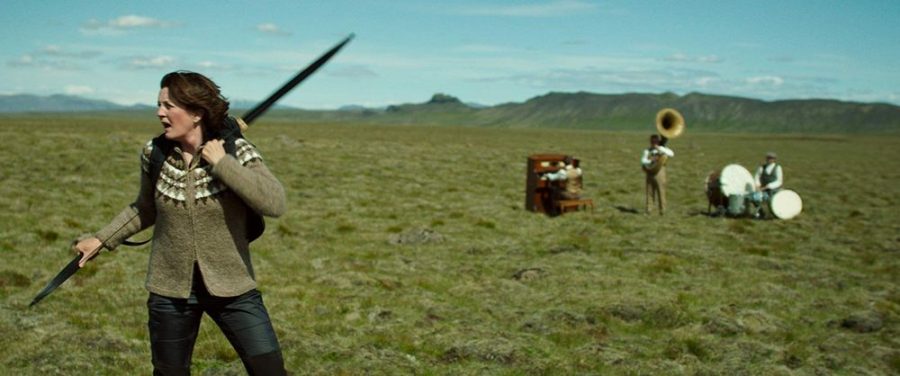Woman At War, an Icelandic film that is part of the Chennai International Film Festival, is a terrific comedy, partly absurdist, on a middle-aged woman’s single-handed fight against globalization and the ecological degradation that it unleashes on her country. Incidentally, the two Icelandic films making rounds at film festivals in India this year – And Breathe Normally and Woman At War – are about the common women force of the ‘most gender equal’ nation in the world. The latter, directed by Benedikt Erlingsson, was Iceland’s official entry to the Oscar race.
***
On a regular day, Halla (Halldóra Geirharðsdóttir) is a jovial choir coordinator who lives in an airy city apartment adorned with lush in-house plants and photographs of Nelson Mandela and MK Gandhi. On certain other days, she is a vigilante superhero equipped with a crossbow and arrow and a rucksack on her back, known in the nation’s newspapers as the mysterious “mountain woman”. In the opening scene, she is running across a vast field, the deep black soil of which seems to be prepared well for next season of cropping. Hot on her heels are a bunch of cops and even a copter that combs for her in the cracks of the ground. She has just dismantled the country’s largest power station, thus sabotaging the operations of a multinational Chinese steel giant.
The larger public response to Halla’s noble war is, nevertheless, polarized. To her aid in her mission is a top level government employee who is a member of her choir, and a farmer she runs into while escaping from the cops one day. While the farmer (who thinks he might be her half cousin) approves of her stance and even lends her his cobalt-blue car, the city-dwellers believe the mountain woman could be a terrorist trying to sabotage the country’s development. This includes Halla’s identical twin sister, Asa, a Yoga practitioner who is preparing to leave for a monastery in India in search of inner peace. As the public disapproval mounts and the government tightens measures to nab the ‘mountain woman’, Halla starts to feel the pressure. To further complicate the plot, Halla receives a letter from an adoption agency on an application she had submitted five years ago. It turns out an Ukrainian little girl named Nyka is waiting for Halla to be her foster mother.
Erlingsson uses fabulous deadpan humor and quirky elements in the narrative, like a team of Ukrainian musicians and an Icelandic band who pop up every now and then on the screen giving musical expression to Halla’s feelings about the motherhood that is awaiting her and the war against environment degradation that she is so much invested in. The troupe of musicians sometimes act as cues to the events that are to come – They play a loud ominous tune as Halla checks into an airport where she could have been arrested. A Latin American tourist who appears and disappears in the narrative, who gets repeatedly arrested by the police in the most hilarious situations. The farmer, who too seems to be leading a solitary life, has a dog named ‘woman’ who barks according to his instructions.
Recommended
The film has breathtaking visuals of Iceland’s glaciers, fields and mountains, and the quintessential small-town nature of the country where everyone seems to know each other or in some cases, be related to each other, and any moderate-sized news becomes a matter of wide public concern. Fifty-something Halla isn’t tired of her solitary life, but seems to be very much content in her independent existence. The film pays attention to her daily life activities like her cycling through the beautiful city streets, swimming in the ocean, or practicing Tai-Chi at home, taking deep breaths as she watches television shows on ecological degradation. In one of the scenes, she wears a dead sheep as a mask to avert the eyes of a drone. In another, the farmer helps an exhausted Halla take a dip in a serene hot water pool. The visuals evoke the close connection she shares with the nature. The induction of a child to the plot completes the theme of environment conservation that the film advocates – ultimately, Halla is waging a war for the young and the future generations.
*****
Woman At War was screened at the Chennai International Film Festival (CIFF) 2018. The festival concludes today.
The Woman at War review is a Silverscreen original review. It was not paid for or commissioned by anyone associated with the film. Silverscreen.in and its writers do not have any commercial relationship with movies that are reviewed on the site.
Feature image courtesy Moviebuff.com



